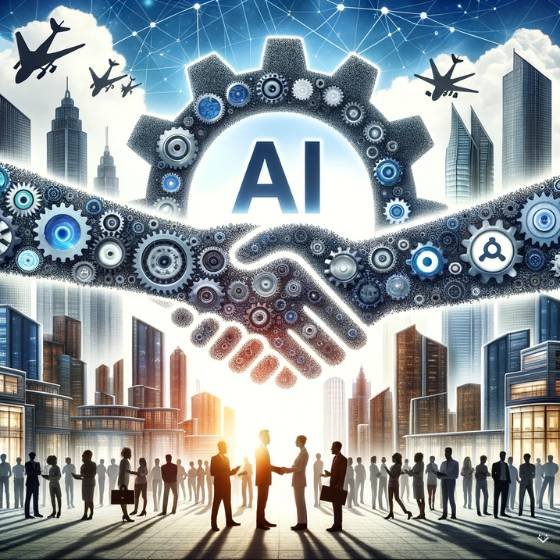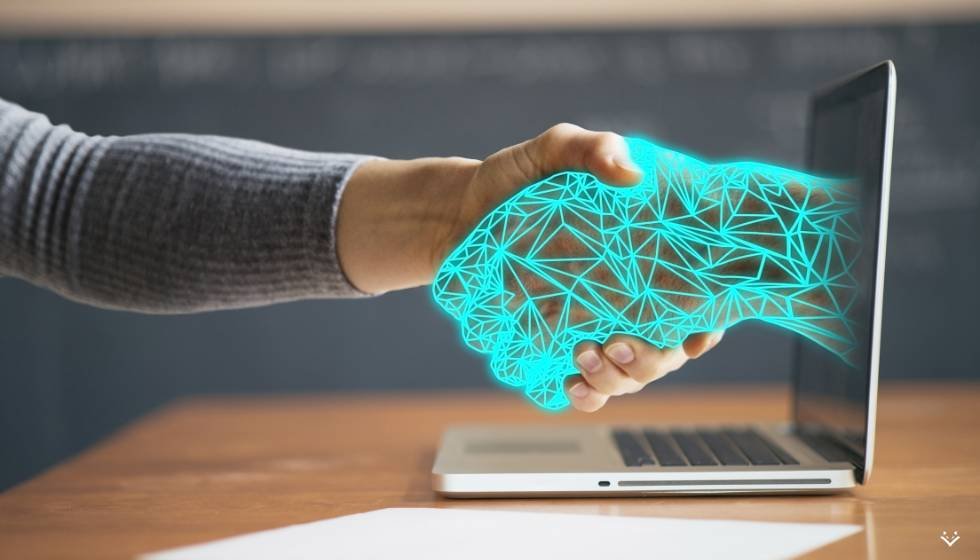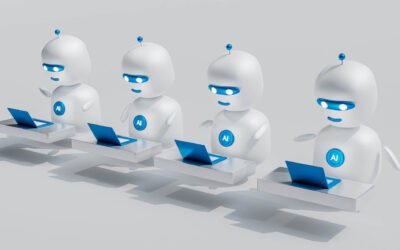tl;dr: Artificial Intelligence (AI) is transforming today’s professional landscape. A Morgan Stanley analyst predicts that AI will impact 44% of the workforce and generate a value of 4.1 trillion US dollars. The influence of AI spans various sectors, from healthcare to retail. While the technology boosts efficiency, concerns about job losses loom large. It’s essential to underline that AI complements rather than replaces human roles. Companies must invest in AI technology and training, fostering a culture of continuous learning. The future will see a collaborative synergy between humans and AI, leveraging the strengths of both to heighten innovation and productivity. SmartFox Group aids companies in harnessing the full potential of AI.
What you can expect
In today’s business world, Artificial Intelligence (AI) has a profound impact on the way we operate. It automates tasks, enhances decision-making, and refines customer service. AI permeates sectors and businesses, introducing exhilarating opportunities and challenges. A Morgan Stanley analyst has forecasted a significant economic influence from AI, predicting it will affect 44% of the workforce and generate an estimated value of 4.1 trillion US dollars. (cnbc) This effect stems from cost optimisation, automation, and altered information processing.
Despite the advancements, there’s palpable apprehension, particularly regarding potential job losses. However, it’s crucial to emphasise that AI doesn’t replace humans but rather augments and supports. Generative AI is reshaping professions, creating new avenues to amplify productivity. Employees must integrate AI, use it ethically, and continually evolve. Businesses and policymakers should work on crafting secure and ethical AI guidelines.
The Role of AI in Business
The present penetration of AI across diverse sectors
Artificial Intelligence (AI) has matured into a pivotal technology, influencing almost every sector in our modern business landscape. From healthcare to finance, manufacturing to retail, real estate to human resources, and even in e-commerce and hospitality, AI has made its mark, altering how businesses function.
In healthcare, AI assists in analysing patient data, diagnosis, and discovering new medications. The manufacturing sector leverages AI for quality control and supply chain optimisation. Retail employs AI for personalised suggestions and enhancing the customer experience. The real estate sector deploys AI for property market analysis and predicting property values. In human resources, AI can aid in candidate selection and streamlining HR processes. E-commerce uses AI for tailored product recommendations and analysing customer behaviour. The hospitality industry utilises AI for managing bookings and workforce planning.
These instances underscore the versatility and efficacy with which AI is employed across various sectors. The list of applications is virtually endless and is set to expand as businesses discern and harness the benefits of this technology.
The Positive Impact of AI on Business Performance
One of the most remarkable effects of AI on businesses is the significant enhancement in efficiency and productivity. AI-driven automation enables the delegation or outsourcing of repetitive tasks, which previously required human intervention. This results in time and cost savings, allowing employees to focus on more complex tasks that demand human expertise.
Furthermore, AI refines decision-making processes. By analysing vast amounts of data, AI can discern patterns and trends that might elude human analysts. This empowers businesses to make more informed decisions and adjust their strategies accordingly.
Myth vs. Reality: Why AI Shouldn’t Incite Fear of Job Losses

Despite the numerous benefits of AI, there are apprehensions that this technology might replace human jobs. However, this myth often contrasts starkly with reality. Indeed, the adoption of AI in many companies has led to employees broadening their skill sets and focusing on more sophisticated tasks. While AI might take on repetitive chores, it cannot entirely replicate human creativity, emotional understanding, and judgment.
Rather than concentrating on potential job losses, AI should be viewed as a tool that boosts productivity and allows humans to concentrate on valuable, creative, and strategic tasks.
What Businesses Need
Investing in AI Infrastructure and Technologies
Successful integration of Artificial Intelligence and generative AI hinges on proper investment in AI infrastructure and technologies. Businesses must commit to the infrastructure and software required to harness AI models effectively and weave them into their operational processes. This encompasses access to cloud-based computational resources, easy retrieval of extensive datasets, and the deployment of AI platforms.
The truth is, most businesses won’t develop AI models in-house; they often lean on agencies or third-party software solutions. By tapping into these resources, they’re able to capitalise on the benefits of AI without shouldering the high costs and substantial legwork of proprietary development. This approach smooths out any apprehension tied to AI integration, letting companies unlock AI’s robust capabilities efficiently.
Key to understand is that the AI revolution doesn’t necessitate running costly hardware in private data centres. Instead, businesses can rely on cloud-based services, granting them flexible access to their AI needs. This scalable approach lets companies focus on core business requirements while enjoying AI’s advantages.
However, AI investments aren’t just short-term; they offer long-term payoffs, enabling businesses to forge innovative solutions that bolster their competitive edge and open up new avenues. AI tech can refine operational processes, uplift product and service quality, and even pave the way for fresh business models.
Fostering a Culture of Openness and Learning
Embedding AI doesn’t solely revolve around technological investment – it demands a cultural shift within businesses. A culture steeped in openness and ongoing learning is pivotal to harness AI’s full potential. Employees should be spurred to explore new technologies and methodologies and to consistently evolve.
Achieving this may involve creating training opportunities and championing AI-focused employee initiatives. Open dialogue and idea exchanges are equally vital. Employees should feel confident voicing their AI integration queries and concerns and be actively involved in shaping AI initiatives.
Spotting AI Opportunities Across Business Sectors
The deployment of AI shouldn’t be constrained to just one niche within a company. Businesses should proactively pinpoint and scrutinise AI opportunities across various sectors. This necessitates close collaboration amongst diverse departments to reap AI’s full rewards. Whether it’s employing AI in sales and marketing for tailored customer offerings or harnessing it for quality control in production – recognising AI use-cases across all business realms can boost overall performance and secure competitive advantages.
What Employees Need
AI Fundamentals: Grasping the Core Principles of AI and Machine Learning
In the AI era, it’s paramount for employees to grasp the foundational principles of AI and Machine Learning. This doesn’t dictate that every staff member must morph into an AI guru, but a rudimentary understanding of how AI systems operate is vital. They should be equipped with knowledge on how machines parse data, spot patterns, and make predictions.
Mastering AI fundamentals enables employees to adeptly wield AI tech, recognising its benefits in their daily tasks. It can dispel reservations or anxieties about the technology, fostering a stronger collaboration mindset with AI systems.
Soft Skills: Creativity, Critical Thinking, and Problem-solving Abilities
Although AI can automate tasks governed by clear directives, soft skills remain invaluable. Creativity, critical reasoning, and the knack to solve intricate problems are human traits that AI can’t easily mirror.
Employees should be motivated to hone and apply these skills, especially in domains where human judgment and empathy shine. AI might aid in data analysis and provide insights, but interpreting results and crafting strategies requires human intelligence and creativity.
Adaptability and Lifelong Learning
The ability to adapt, coupled with an appetite for lifelong learning, is crucial to thrive in a rapidly transforming work landscape. Employees should exhibit eagerness to learn novel technologies and methodologies and to incessantly progress.
Companies ought to provide training and educational avenues to back employees in refining their skills and knowledge. This not only encompasses technical training but also ethical AI use guidance, ensuring AI systems are leveraged responsibly.
In summary, in the AI epoch, employees need a foundational understanding of AI principles, an enhancement of their soft skills, and a readiness for adaptability and perpetual learning. These competencies will equip them to collaborate effectively with AI, maximising the potentials of this technology.
The Benefits of Human and AI Collaboration
Enhancing Capabilities with AI Assistance
Integrating AI significantly augments employee capabilities. AI can process vast data sets, recognise patterns, and make predictions beyond typical human reach. This enables employees to make superior decisions and devise informed strategies. In industries like manufacturing and retail, specialists are already working closely with AI systems to shape more efficient production processes, manage inventory, and develop customer-centric solutions. This synergy between humans and AI opens up novel avenues and amplifies workforce potential.
Creating Space for Innovation and Strategic Thought
By automating repetitive tasks and data analysis, AI carves out a space for innovation and strategic thinking. Employees are afforded the chance to focus on conceptualising new ideas, enhancing products and services, and pinpointing business opportunities. Furthermore, AI aids in swiftly identifying trends and market patterns, offering businesses a competitive edge. Employees can proactively react to these insights, making strategic decisions that propel their company forward.
In sum, the collaboration between humans and Artificial Intelligence unlocks a world rife with possibilities. It boosts efficiency, broadens employee capabilities, and fosters an environment for innovation and strategic thought. Companies leveraging this synergy can bolster their competitive standing, prepping for a promising future in the AI age.
Challenges and Hurdles
Data Privacy and Ethical Issues Relating to AI
The integration of Artificial Intelligence brings forth vital data privacy and ethical questions. AI systems frequently process vast volumes of sensitive data, and safeguarding this information is critical. Data breaches or ethically questionable practices not only jeopardise customer trust but can also trigger legal repercussions. Hence, transparency and ethics in AI usage are paramount. Companies need to ensure their AI systems adhere to ethical guidelines, operate without discrimination, and make transparent decisions. This demands clear and accountable governance to ensure data privacy policies are respected and ethical standards upheld.
Fears of Technological Shift and Uncertainty
Embedding Artificial Intelligence into daily work routines might stir concerns and uncertainty among employees, as previously discussed. The notion of machines taking over tasks previously managed by humans can arouse job loss fears. However, as reiterated, AI’s aim is to complement and amplify human capabilities, not supplant them. It’s crucial for employees to be actively encouraged and informed to dispel these concerns. Effective communication from company leadership about AI’s benefits and the long-term vision is crucial. Training and education can help prep employees for AI integration and equip them with the confidence to effectively engage with AI technologies.
Resistance to Changes in Corporate Culture
Integrating Artificial Intelligence often demands shifts in corporate culture, potentially meeting resistance. Both employees and leaders might need to adapt to new work methods, processes, and technologies. This calls for a mindset shift and a willingness to abandon old habits and thought patterns. Overcoming this resistance necessitates clear communication, training, and management support. It’s essential to actively involve employees in the change process, heed their concerns, and illustrate how AI integration can instigate positive transformation. An open and inclusive corporate culture can smoothen this transition and foster AI acceptance.
Addressing these challenges and hurdles is crucial to ensure the successful integration of Artificial Intelligence into businesses. This requires a holistic approach, factoring in technological, ethical, and cultural aspects.
Training and Professional Development
The Significance of Training and Continuous Learning in AI Engagement
In a world governed by technology, continuous learning is indispensable. Training and professional development play a pivotal role in ensuring that employees cultivate the necessary skills and understanding to proficiently engage with artificial intelligence. The importance of such training permeates all organisational levels, from executives to interns.
Training equips employees with a foundational understanding of how AI and Machine Learning operate. They learn how to deploy AI systems effectively and interpret their outcomes. Additionally, training is essential to address ethical concerns related to AI, ensuring that AI systems are deployed responsibly.
Types of Training: Technical Proficiency and Ethical Implications
Training related to artificial intelligence should span a wide array of topics. This includes not only the development of AI models but primarily understanding their operation, benefits, and the expertise to use and govern them effectively. Employees should be equipped to grasp the functioning of AI systems, provide appropriate data to them, and operate them proficiently.
Besides technical proficiency, training in ethical dimensions is paramount. Employees must comprehend the ethical tenets of engaging with artificial intelligence and understand how to ensure that AI systems don’t discriminate or act inappropriately. This encompasses knowledge about which data is suitable for AI and why. Raising awareness of ethical challenges and fostering ethical conduct is key to winning customer and public trust, ensuring the responsible use of Artificial Intelligence.
The Corporate Role in Supporting Training Initiatives
Corporations bear a substantial responsibility in facilitating training and continuous learning related to Artificial Intelligence. They should allocate resources to fund training and ensure that employees receive the necessary time and support to partake in such programs.
Moreover, corporations should cultivate a culture of lifelong learning. This can be achieved through incentives for continuous learning, establishing training centres, and aiding employees in refining their skills.
In summary, training and professional development related to artificial intelligence are vital for developing employee capabilities and ensuring the successful integration of AI in businesses. Corporations investing in their employees’ training will not only benefit from technological advantages but also foster a future-ready and competent workforce.
A Hopeful Gaze to the Future: Human and AI as Allies

Despite the challenges and obstacles that the integration of Artificial Intelligence brings, we should gaze optimistically towards the future. The partnership between humans and AI offers profound benefits, from boosting efficiency, expanding human capabilities to creating room for innovation and strategic thinking. We are on the brink of an era where AI complements human capabilities, empowering us to operate at an elevated level.
Companies and employees should collaboratively engage in AI integration, emphasizing shared action. Companies should invest in training and continuous learning to prep their employees for the AI era. They should promote a culture of openness and learning, uphold ethical principles, and proactively shape AI integration.
In a world moulded by AI, corporations and employees can collectively seize the opportunities AI offers. By engaging collectively and gearing up for a future of collaboration, we can operate successfully in the Artificial Intelligence era, shaping a promising future.
AI’s Future at the Workplace: Trends and Perspectives
The future of Artificial Intelligence and the workplace promises thrilling evolutions. As we already journey towards human and AI collaboration, we’ll witness even more profound changes in the years ahead. Novel AI technologies will emerge, further refining our work methods and amplifying human creativity.
It’s pivotal that we stay forward-looking, constantly enhancing our skills and knowledge to harness AI’s potential. We encourage businesses to invest in training and professional development, prepping their workforce for the unstoppable era of Artificial Intelligence. The SmartFox Group stands as a reliable ally, helping to identify AI potentials and train employees accordingly, ensuring that they acquire the requisite skills to thrive in this dynamic professional environment. Integrating AI necessitates a close partnership between humans and machines, laying the foundation for a promising and successful future.
We Support You in Implementing Generative AI in Your Business
Your are thinking about deploying Generative AI in your business, but unsure of how and where to start? Or perhaps you don’t have the time to seek out and gather all the information about Generative AI on your own? We are your partner for a successful future. We help you understand the diverse possibilities of Generative AI, define suitable application scenarios, and support you in its implementation in your business. Contact us now and get free consultation – for a successful digital future.




